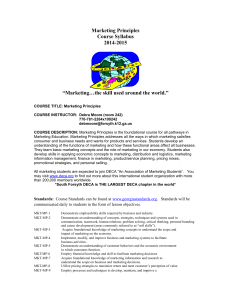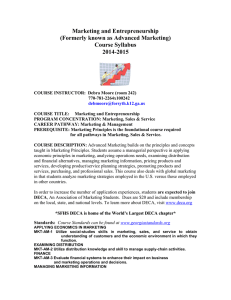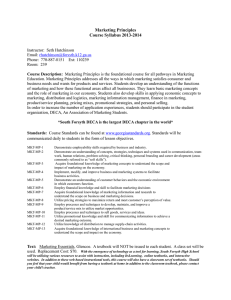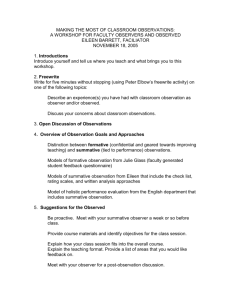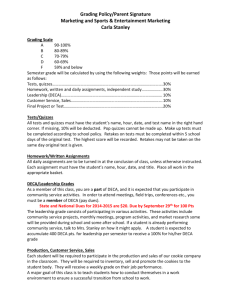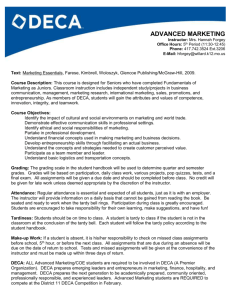IB Business and Management
advertisement
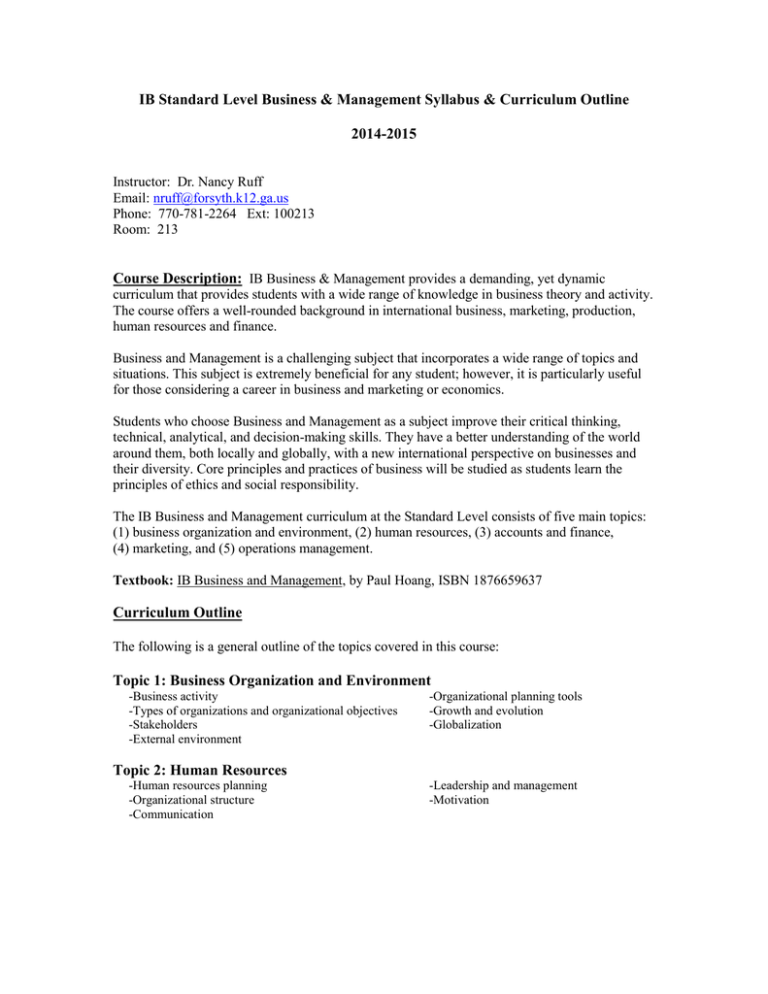
IB Standard Level Business & Management Syllabus & Curriculum Outline 2014-2015 Instructor: Dr. Nancy Ruff Email: nruff@forsyth.k12.ga.us Phone: 770-781-2264 Ext: 100213 Room: 213 Course Description: IB Business & Management provides a demanding, yet dynamic curriculum that provides students with a wide range of knowledge in business theory and activity. The course offers a well-rounded background in international business, marketing, production, human resources and finance. Business and Management is a challenging subject that incorporates a wide range of topics and situations. This subject is extremely beneficial for any student; however, it is particularly useful for those considering a career in business and marketing or economics. Students who choose Business and Management as a subject improve their critical thinking, technical, analytical, and decision-making skills. They have a better understanding of the world around them, both locally and globally, with a new international perspective on businesses and their diversity. Core principles and practices of business will be studied as students learn the principles of ethics and social responsibility. The IB Business and Management curriculum at the Standard Level consists of five main topics: (1) business organization and environment, (2) human resources, (3) accounts and finance, (4) marketing, and (5) operations management. Textbook: IB Business and Management, by Paul Hoang, ISBN 1876659637 Curriculum Outline The following is a general outline of the topics covered in this course: Topic 1: Business Organization and Environment -Business activity -Types of organizations and organizational objectives -Stakeholders -External environment -Organizational planning tools -Growth and evolution -Globalization Topic 2: Human Resources -Human resources planning -Organizational structure -Communication -Leadership and management -Motivation Topic 3: Accounts and Finance -Sources of finance -Investment appraisal -Working capital -Final accounts -Ratio analysis Topic 4: Marketing -The role of marketing -Marketing planning -Marketing Mix: Product, Price, Promotion, Place -International marketing -E-commerce Topic 5: Operations Management -Production methods -Costs and revenues -Break-even analysis -Quality assurance -Location General Assessments Tests, quizzes, and case studies will be given periodically throughout the year to ensure that the student has grasped the main concepts of the material. Projects are extremely important in the IB Business & Management curriculum. They help to relate current topics and real business situations to material covered in class. Daily assignments and homework: There will be frequent in-class and out-of-class assignments. IB Assessments The first assessment, called the Internal Assessment, will count 20% of the IB score, which is graded by the instructor. This assessment is a 1,500-word documentary focused on answering a research question about a real business. The second assessment called the External Assessment, counts for 80% of the IB score and is graded “external” of SFHS by the IB organization. This is a three-hour exam given over two days and takes place in May. The first part (40%) will cover an IB case study, which we will have to study well in advance of the test. The second part (40%) will come from the five business modules we will cover during the course of the year. Make-up Policy: Make up work is defined as work assigned during a student's absence, not work assigned prior to an absence. The student has five (5) school days upon returning to school to complete makeup work. The teacher has the discretion to grant a longer period to make up work, if there are extenuating circumstances. When a student is not absent, but fails to turn in an assignment on the due date, the following penalties will apply: One day late: 15 pts. Two days late: 25 pts. Three days late: 35 pts. After 3 days: The highest grade you may obtain will be a 50. Make-up Policy regarding quizzes and tests: Class time will not be used for make-up purposes. If you miss a quiz or test, plan on making up that assessment before school on the day following your absence. Grading Calculations EOCT Course Average = 40% (1st Sem. Course Work) + 40% (2nd Sem. Course Work) + 20% EOCT 1st & 2nd Semester Course Work = 75% Summative + 25% Formative Non-EOCT Course Average = 50% (1st Sem. Course Work) + 50% (2nd Sem. Course Work) 1st and 2nd Semester Course Work = 75% Summative = 25% Formative Concept of formative assessment: http://pareonline.net/getvn.asp?v=8&n=9 *Formative Assessments include, but are not limited to homework, class work, practice tests, rough drafts, and sections of projects/ research papers/presentations. *Summative Assessments include, but are not limited to unit tests, final projects, final essays, final research papers, and final presentations. Grading Policy A = 90 – 100 B = 80 – 89 C = 70 – 79 Failing = Below 70 DECA All students enrolled in IB Business & Management are expected to join DECA, an international association for students interested in business and marketi5ng. DECA is co–curricular, meaning its mission is to provide opportunities to apply the knowledge and skills learned in the classroom. Participation in DECA helps build self–esteem as well as marketing competence through competitive events at the local, state, and international levels. Students will also develop leadership skills and participate in community service projects. Dues are $20.00 and include local, state, and national membership. Class Rules and Procedures You should maintain a 3-ring binder with all homework, class notes, tests and quizzes, and additional materials. You are not allowed in the storage rooms of the classroom without permission. Water is the only drink permitted in class. You may not bring food into the classroom. If you bring soft drinks/coffee, juices or food into the class, they will be thrown out. If you work on assignments from other classes during IB Business, the instructor will take up these materials and return to you at the end of the day. You are not allowed on computers unless instructed to do so. Printing is only allowed with instructor permission. Please place the syllabus in your class binder.
